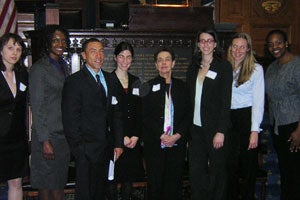As a witness to terrible domestic violence until the age of eight, “Jamal” still carries his worries into the classroom everyday. Even though he and his mother are now safe, he’s unable to focus on his schoolwork, frequently acts out, and has been suspended from third grade.
Helping children like Jamal succeed in school is the focus of the innovative Trauma and Learning Policy Initiative (TLPI), a joint project of HLS’s WilmerHale Legal Services Center and the Boston-based nonprofit organization, Massachusetts Advocates for Children. Through TLPI, 2L and 3L students in the HLS Clinical Legal Education Program provide legal representation to help struggling clients achieve at their highest levels, and then bring “the voice of the children” from their one-on-one casework to their advocacy for systemic, social change.
In early April, 10 Harvard Law students organized a Massachusetts State House briefing in which teachers and others described what schools can do to help the growing number of traumatized children, like Jamal, overcome barriers to learning and find success.
At the briefing, co-sponsored by State Representatives Alice Wolf of Cambridge and Marty Walz of Cambridge and Boston, educators asked legislators for continued state funding to create “trauma-sensitive” environments where all children, including those victimized by physical and other trauma, can learn. Teachers, administrators, and school staff from schools trained in trauma-sensitive approach advocated by TLPI gave testimony on how an understanding of trauma has helped to significantly reduce absences, suspensions, and detentions.
“Each speaker explained how he or she attempting to make school a better and safer environment for young minds to grow,” says Jose Morales ’09, who was the primary organizer of the event, which was his clinical project. “There is no simple solution or general prescription that will help students overcome trauma as a barrier to learning. This issue requires personal attention and each school to familiarize themselves with their students.” But, he adds, “The participating schools and their success stories are testaments to what a community can do when it unites.”
“It was a joy to see the legislators listen to [educators describe] … the impact that the grants have had on their school communities,” says Emily Blumberg ’10.
Students say the event was an invaluable educational experience in advocacy and policy work. “Oftentimes, as law students, we can get so caught up in litigation as a tool for advocacy that we forget there are a plethora of avenues through which change can be pursued,” says Adora Asonye ’09.
Adds Melissa Causey ’10, “The kind of skills and knowledge that legislative campaigns require can feel so different from those that we’re developing in our casework. Since I so firmly believe that the two have to go hand in hand … connecting legislators to schools gave me the opportunity to think about how I want to fit into this piece of education advocacy.”
The legislative briefing grew out of the HLS clinical course, “Education Advocacy and Systemic Change: Children at Risk” through TLPI and the HLS Clinical Legal Education Program
Susan Cole, HLS Clinical Instructor and Lecturer on Law, says the course focuses on individual cases and legislative advocacy as part of a multi-strategic approach. “Our goal is to teach HLS students how to use their litigation and negotiation skills to improve the lives of individual children and then bring the lessons learned to the state legislature, the courts, and executive offices where true systemic changes can be made,” Cole says. Students in the course incorporate federal and state laws, education, psychology, and neurobiology into their work on behalf of vulnerable children.
Cole notes that Wolf has spearheaded the trauma sensitive schools legislation since 2000, and she thanked legislators for their support. “Representatives Wolf and Walz have worked tirelessly on behalf of children,” says Cole.
Rachel Clarke ’10 says, “The stories of children’s experiences and the psychological connections to their behavior and academics seemed to really evidence how trauma sensitive schools could make substantial change in students’ lives and the school environment.”
Other HLS students who participated were Samantha Crane ’09, Tracy Ebanks ’10, Sara Madavo ’10, Anna Myles Primakoff ’10, and Cara Suvall ’10.
